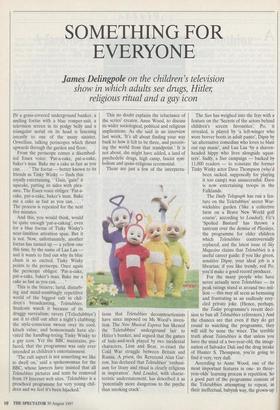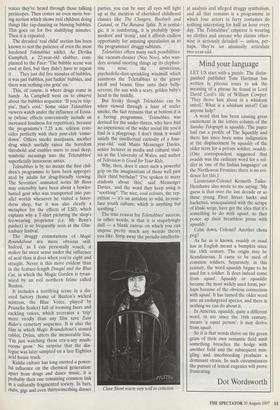SOMETHING FOR EVERYONE
James Delingpole on the children's television
show in which adults see drugs, Hitler, religious ritual and a gay icon
IN a grass-covered underground bunker, a smiling foetus with a blue romper-suit, a television screen in its podgy belly and a triangular aerial on its head is listening intently to one of the many sinister, Orwellian, talking periscopes which thrust upwards through the garden and floor.
From the periscope comes a disembod- ied Essex voice: 'Pat-a-cake, pat-a-cake, baker's man. Bake me a cake as fast as you can. . . . ' The foetus — better known to its friends as Tinky Winky — finds this royally entertaining. " Gain, 'gain!' it squeaks, patting its sides with plea- sure. The Essex voice obliges: 'Pat-a- cake, pat-a-cake, baker's man. Bake me a cake as fast as you can. . . . ' The process is repeated for the next five minutes.
And this, you would think, would be quite enough 'pat-a-caking', even for a blue foetus of Tinky Winky's near-limitless attention span. But it is not. Now, unfortunately, another foetus has turned up — a yellow one this time, by the name of Laa Laa and it wants to find out why its blue chum is so excited. Tinky Winky points to the periscope. Once again the periscope obliges: Pat-a-cake, pat-a-cake, baker's man. Bake me a cake as fast as you can. . . . '
This is the bizarre, lurid, disturb- ing and mind-numbingly repetitive world of the biggest cult in chil- dren's broadcasting, Teletubbies. Students watch it because of its druggy surrealism; ravers (`Teleclubbies') use it to chill out after a night's clubbing; the style-conscious swoon over its cool, kitsch value; and homosexuals have ele- vated the handbag-toting Tinky Winky to a gay icon. Yet the BBC maintains, po- faced, that the programme was only ever intended as children's entertainment.
`The cult aspect is not something we like to dwell on,' said a spokeswoman for the BBC, whose lawyers have insisted that all Teletubbies pictures and texts be removed from 19 Internet web sites. `Teletubbies is a preschool programme for very young chil- dren and we feel it's been hijacked.' This no doubt explains the reluctance of the series' creator, Anne Wood, to discuss its wider sociological, political and religious implications. As she said in an interview last week, 'It's all about finding your way back to how it felt to be three, and perceiv- ing the world from that standpoint.' It is not about, she might have added, a land of psychedelic drugs, high camp, fascist sym- bolism and quasi-religious ceremonial.
These are just a few of the interpreta- tions that Teletubbies deconstructionists have since imposed on Ms Wood's inven- tion. The New Musical Express has likened the Teletubbies' underground lair to Hitler's bunker, and argued that the games of hide-and-seek played by two incidental characters, Lion and Bear, re-enact the Cold War struggle between Britain and Russia. A priest, the Reverend Alan Gar- row, has declared that Teletubbies' enthusi- asm for litany and ritual is clearly religious in inspiration'. And Loaded, with charac- teristic understatement, has described it as `potentially more dangerous to the psyche than smoking crack'. The Sun has weighed into the fray with a feature on the 'Secrets of the actors behind children's screen favourites'. Po, it revealed, is played by 'a left-winger who wore bower boots in adult panto', Dipsy by 'an alternative comedian who loves to blast out rap music', and Laa Laa 'by a shaven- headed hippy who lives alongside squat- ters'. Sadly, a Sun campaign — backed by 11,000 readers — to reinstate the former Tinky Winky actor Dave Thompson (who'd been sacked, supposedly for playing it too camp) was unsuccessful. Dave is now entertaining troops in the Falklands.
The Daily Telegraph has run a fea- ture on the Teletubbies' secret War- wickshire garden (`like a collective farm on a Brave New World golf course', according to Loaded); Viz's `Spoiled Bastard' has thrown a tantrum over the demise of Playdays, the programme for older children which Teletubbies controversially replaced; and the latest issue of Sky Magazine claims that Teletubbies is a useful career guide: if you like green, sensitive Dipsy, your ideal job is a librarian; if you like trendy, red Po, you'd make a good record producer.
For the many people who have never actually seen Teletubbies — its peak ratings stand at around two mil- lion — this may all seem as bemusing and frustrating as an endlessly recy- cled private joke. (Hence, perhaps, the Today programme's recent deci- sion to ban all Teletubbies references.) And the chances are that even if they do get round to watching the programme, they will still be none the wiser. The terrible truth about Teletubbies is that unless you have the mind of a two-year-old, the imagi- nation of Salvador Dali and the drug intake of Hunter S. Thompson, you're going to find it very, very dull.
According to Anne Wood, one of the most important features in one- to three- year-olds' learning process is repetition. So a good part of the programme consists of the Teletubbies attempting to repeat, in their ineffectual, babyish way, the grown-up voices they've heard through those talking periscopes. Then comes an even more bor- ing section which shows real children doing things like tap-dancing or blowing bubbles. This goes on for five stultifying minutes. Then it is repeated.
The dreaded 'real child' section has been known to test the patience of even the most hardened Teletubbies addict. As Devika Campbell, a 22-year-old dubber, com- plained to the Face: 'The bubble scene was cool at first, but they didn't have to repeat it . . . They just did five minutes of bubbles, it was just bubbles, just fuckin' bubbles, and there was nothing else goin' on.'
This, of course, is where drugs come in handy. As Campbell went on to observe about the bubbles sequence: 'If you're trip- pin', that's cool.' Some older Teletubbies viewers watch under the influence of Ecsta- sy (whose effects conveniently include an increased fondness for repetition), because the programme's 7.25 a.m. edition coin- cides perfectly with their post-club 'come- down'. Others smoke marijuana, another drug which usefully raises the boredom threshold and enables users to read deep, symbolic meanings into the Teletubbies' superficially innocuous antics. Teletubbies is by no means the first chil- dren's programme to have been appropri- ated by adults for drug-friendly viewing. The Seventies' animated series Mr Benn may ostensibly have been about a bowler- hatted gent who was transported into par- allel worlds whenever he visited a fancy- dress shop, but it was also clearly a metaphor for the effects of LSD, which explains why a T-shirt picturing the shop's fez-wearing proprietor (i.e. Mr Benn's pusher) is so frequently seen at the Glas- tonbury festival.
The druggy connotations of Magic Roundabout are more obvious still. Indeed, as I can personally vouch, it makes far more sense under the influence of acid than it does when you're eight and straight. Never is this more evident than in the feature-length Dougal and the Blue Cat, in which the Magic Garden is tyran- nised by an evil northern feline called Buxton.
It includes a terrifying scene in a dis- used factory (home of Buxton's wicked mistress, the Blue Voice, played by Prunella Scales) full of looming faces and cackling voices, which recreates a 'trip' more vividly than any film save Easy Rider's cemetery sequence. It is also the film in which Magic Roundabout's stoned rabbit, Dylan, utters the memorable line, `I'm just watching these cra-a-azy mush- rooms grow.' No surprise that the dia- logue was later sampled on a late Eighties acid house track.
Kiddie culture has long exerted a power- ful influence on the chemical generation: apart from drugs and dance music, it is probably their one remaining common link in a culturally fragmented society. In bars, clubs, gigs and even thirtysomething dinner parties, you can be sure all eyes will light up at the mention of cherished childhood classics like The Clangers, Roobarb and Custard, or The Banana Splits. It is nostal- gic, it is comforting, it is probably 'post- modern' and 'ironic', and it affords endless opportunity for amusing speculation as to the programmes' druggy subtexts.
Teletubbies offers many such possibilities: the vacuum-cleaner (Noo Noo), who wan- ders around snorting things up its elephan- tine nose; the mysterious, psychedelic-dust-sprinkling windmill which summons the Teletubbies to the grassy knoll and beams films onto their belly- screens; the sun with a scary, golden baby's head in the middle.
But freaky though Teletubbies can be when viewed through a haze of reefer smoke, the fact remains that at bottom it is a boring programme. `Teletubbies was devised for the under-threes, who have had no experience of the wider social life you'd find in a playgroup. I don't think it would satisfy the intellectual curiosity of a four- year-old,' said Maire Messenger Davies, senior lecturer in media and cultural stud- ies at the University of Wales, and author of Television is Good for Your Kids.
Why, then, does it exert such a powerful grip on the imaginations of those well past their third birthday? 'I've spoken to many students about this,' said Messenger Davies, 'and the word they keep using is "soothing". The nice, cool colours, the rep- etition — it's an antidote to wild, in-your- face youth culture, which is anything but soothing.'
The true reason for Teletubbies' success, in other words, is that it is stupefyingly dull — a blank canvas on which you can impose pretty much any weirdo theory you like. Strip away the pseudo-intellectu- Clare Short reacts very well to criticism al analysis and alleged druggy symbolism, and all that remains is a programme in which four actors in furry costumes do nothing interesting for half an hour every day. The Teletubbies' emperor is wearing no clothes and anyone who claims other- wise is seriously deluded — unless, per- haps, they're an unusually articulate two-year-old.



















































 Previous page
Previous page